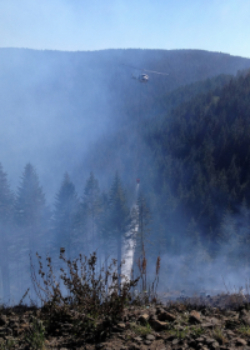Olympic Peninsula WUI and WildFire Hazard

water down on
burning trees
Wildfire is one of the most destructive forms of energy on our planet. Often, the idea of wildfire brings up images of ash and smoke, of evacuation and loss. This is not surprising, as often we are aware of wildfire only when it threatens us or those we know. Only seldom is “wildfire” used in the same context as regrowth, renewal, or even the idea of “natural.” But fire is a normal and essential part of many forest ecosystems, including those of the north Olympic Peninsula, and living in this area demands an understanding of fire as an ecological process.
Increases in the number of homes being built within the wildland-urban interface create urgency in defining the responsibility and interactions of humans within these fire-prone landscapes. In nature, fire is a force of renewal. In neighborhoods, fire can destroy homes and lives, endanger firefighters, and adversely affect the relationship between people and the rest of nature. In our quest to be closer to and more a part of nature, we have pushed into wildland areas, areas shaped by fire. With our presence and our investments at stake, protecting the homestead becomes a priority. With adequate forethought and proper preparations, we can adapt to changes in our environment. Living in the interface between the forest and developed land evokes a new set of rules and methods of thinking of our place in nature.
This project was a joint effort of the Huxley College Peninsulas program, the Resilience Institute, and the Fire Service agencies within Clallam and Jefferson counties. Funding was graciously provided by FM Global, Inc., Western Washington University, and Peninsula College.
Wildfire Atlas/Peninsula Contact:
Dwight Barry, Ph.D.
(360) 417 6586 office
(360) 417 6287 lab